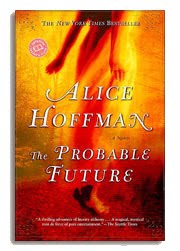The Probable Future
 I'm a fan of Alice Hoffman's books. And while she didn't lose me with "The Probable Future" (Ballantine, 2003, 352 pp. $13.95 paperback), I didn't love it.
I'm a fan of Alice Hoffman's books. And while she didn't lose me with "The Probable Future" (Ballantine, 2003, 352 pp. $13.95 paperback), I didn't love it.True to the author's form, the book draws you in with intricate interweaving plotlines and mystical goings-on.
"The Probable Future" revolves around 13 generations of women in the Sparrow family who have special powers and are native to a small Massachusetts hamlet called Unity. Each of the women bears just one female child who is given her unique gift on her 13th birthday.
The powers range from not being able to feel pain - a "gift" that gets Rebecca Sparrow killed on suspicion of being a witch in the 17th century - to being able to discern a lie, to being able to look at a person and see how they die.
(SPOILER ALERT:) The latter gift is that of one of this novel's main characters, the predictable and annoying teenager Stella Sparrow.
The rebellious Stella's gift gets her in trouble pretty quickly. Or, rather, it gets her philandering father in trouble. During a dinner out to celebrate her 13th birthday, Stella spies the death of a woman seated across the room and begs her father to do something to stop her murder. Relating this tale to the police turns out to be not such a good idea when the women does die in the way his daughter described and now Will is the main suspect.
Stella's mother, estranged from her father and whom she can't hide her hate for, is drawn back to the childhood home she abhors to try to protect Stella, who is forced to move there after her father leaks the story to the big bad press. Every Sparrow woman seems to hate her mother, and Jenny Sparrow (whose gift is being able to dream other peoples' dreams) now must make peace with her own ailing mother, Elinor (who can see peoples' lies).
And so everybody gets drawn back to Unity to figure it all out, and past and present are interwoven - or unraveled as it may be. Sparrows start nearly liking Sparrows again, or re-discovering a tolerance bordering on love. The story of the present and of the past Sparrow women continues until we get to the climax of the story, where it seems every loose end is tidied up in a bow - a little too neatly.
What drags the novel down is that you can see the ending coming from a mile away. You can see the unrequited loves about to become requited and the killers about to get their due.
It was just kinda boring. I wanted to finish the novel just to get it over with rather than to stay with the characters to see what happened to them.
Was it worth reading? Yes.
Was it a great read? No.
Maybe I simply need to stop reading every single book by a favorite author. Beattie, Hoffman, Atwood, Kingsolver, Tartt, for example. They are bound to disappoint sometime.
Labels: Alice Hoffman, The Probable Future
 RSS
RSS



0 Comments:
Post a Comment
<< Home